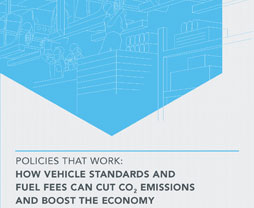Policies That Work: How Vehicle Standards and Fuel Fees Can Cut CO2 Emissions and Boost the Economy
13 December 2013

View Webinar Content
Presentation: Introduction to the webinar and panelists
Presentation—Policies that Work: How Vehicle Standards and Fuel Taxes Can Cut CO2 Emissions and Boost the Economy
Transcript—Webinar audio transcript
Policies That Work analyzes energy, transportation, and climate policies from around the world to determine which work, which do not, and why. Written by leading policy and technical experts in the ClimateWorks Network, the report provides an analytical framework to help government leaders evaluate proposed policies in terms of their economic benefits and effectiveness in reducing greenhouse gas emissions. Policies That Work focuses on the sectors responsible for the vast majority of the world’s energy use and greenhouse gas emissions, including vehicles and fuels, appliances, power, industry, and buildings.
In this webinar-based training, we present policies to improve energy efficiency of passenger vehicles. CO2 emissions from road transport are expected to grow by more than 2% per year between 2010 and 2030, largely spurred by the dramatic increase in the number of automobiles hitting the roads in China, India, and other developing economies. Two policies have proved most effective at significantly reducing emissions from road transportation: vehicle performance standards and economic signals such as fuel and vehicle fees and incentives. When designed and implemented correctly, these policies can save significant amounts of fuel and associated CO2 emissions.
Panelists
 Dr. Laura Segafredo, Senior Global Research Associate, ClimateWorks Foundation
Dr. Laura Segafredo, Senior Global Research Associate, ClimateWorks Foundation
At ClimateWorks, Segafredo leads a number of research projects in collaboration with several partner organizations, ranging from scientific groups to multilateral development banks. Most of her work focuses on best practice energy policies and their impact on emission trajectories. She is also working on the quantification of the multiple benefits of climate mitigation policies. She co-authored a number of policy brief and reports, including the Policies that Work series, and she was a lead author of the most recent Emissions Gap Report, which was published by the UN Environmental Program (UNEP). Segafredo obtained her PhD in Energy Studies and her BA in Economics from the University of Padova (Italy), her MSc in Economics from the University of Toulouse (France). She was a Visiting Scholar at the University of California, Berkeley (CA).
 Dr. Francisco Posada Sanchez, Passenger Vehicle Researcher, International Council on Clean Transportation (ICCT)
Dr. Francisco Posada Sanchez, Passenger Vehicle Researcher, International Council on Clean Transportation (ICCT)
Sanchez’s interests are focused on developing technology roadmaps for improving the emissions and fuel economy performance of passenger cars and on assessing the cost of implementing those technologies in emerging markets. He is the technical lead on vehicle emission control technology, and vehicle emission and fuel economy testing. Sanchez holds a B.S. in Mechanical Engineering from University of Valle, Colombia, as well as a Ph.D. in Mechanical Engineering from West Virginia University.
